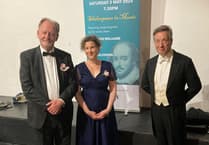IT’S BEEN an exciting start to 2020 for the University for the Creative Arts (UCA). First, vice-chancellor Magdalene Odundo was made a Dame in the New Year Honours list, then alumnus Chris Butler scooped a Golden Globe for his animation Missing Link. And just days later, the UCA announced its first overseas campus, the Institute of Creativity and Innovation, is set to open in Xiamen, China, this September.
Add to that UCA Farnham’s new Film and Media Centre, opened last year, and the imminent construction of its new accommodation block, and the result is a busy few years for the university’s deputy vice-chancellor Alan Cooke, who sat down with the Herald for a chat about the institution’s future plans at another of its great success stories, the Farnham Repair Cafe.
Hi, Alan. A lot has happened at the UCA in the past year or so – and now China! How did that come about?
“Through Bashir’s [UCA vice-chancellor Professor Bashir Makhoul’s] connections. He’s been associated with China for about 15 or so years, and has set up joint institutes in the past for previous universities.
“Those have been joint ventures quite like this one, but more multi-discipline. This is specifically for the creative industries and creative courses.”
So how will it work?
“Xiamin University, which is one of the top Chinese universities, about an hour from Hong Kong, is setting up the joint institute on one of their three campuses. The first year starts in September with four courses and about 300 students, and the idea is it’s a four-year course, and at the end of the four years, students will get a dual degree from Xiamin University and the UCA.
“After two years in Xiamin, students will also have the option to come over here to the UK and do two years here as well. It gives them flexibility.
“We provide just under half of the teaching, so they learn in Chinese and in English, and we bring our expertise of the creative industries from here in the UK, over to China.”
Does it work the other way – can UK students go over there?
“Yes, it’s a dual partnership, so we can go over there too. The courses are both undergraduate and postgraduate, but it’s more likely postgraduate students will go over there and do some work. I’ve been over there myself and they’ve got fantastic facilities.”
So is it really the first of its kind in China?
“The first specific partnership, yes. Xiamin is a multi-discipline university and they’ve got 20,000-plus students already. But the interest for the Chinese is in the creative elements.
“China has focused a lot on teaching manufacturing skills, but now they are looking for creativity, innovation and development.
“That they’re bringing in that expertise from ourselves, the number one creative university in the UK, is great for us.”
In terms of the teaching staff, are you sourcing people out there or sending people from the UK?
“No, they will be they will be non-Chinese. They’re looking to bring in expertise – not necessarily just UK or British, but people from all over Australia, the States, Asia, who we will train up in the UK before they go out there.
“The recruitment process has already started, and we’re being very careful to make sure we pick people with the right experience.”
I imagine the language barrier is quite a big hurdle?
“Obviously having Chinese language would be a benefit to any applicants, but my understanding is Chinese students are expected to learn English from an early age. So when they get to university, they’ve got a quite a good understanding of English.
“But the courses are joined, so while 40 per cent of the courses are delivered in English, there will be Chinese lecturers as well.”
You’re starting with 300 student in the first year, but how many can the campus accommodate in total?
“We are looking at getting up to 3,000 or 4,000 students over five or six years – so it will be a significant campus over there.
“They’ve got the buildings already to accommodate this number, and Bashir went over before Christmas to agree the layouts.
“There are going to be state-of-the-art laboratories and teaching areas, and the student union is on a lake! The campus is actually quite similar to Surrey.”
Is it safe to assume this partnership bolsters the university financially too?
“It does, definitely. We’re waiting for the spring budget, but the noises that have been coming out from government are it is focusing on further education (covering all qualifications gained after aged 16, lower than a degree), which probably means universities will have to be more reliant on our home students and European students.”
Could Brexit scupper that?
“The government and Europe have agreed the 2020/21 European students will get funded for their courses, and so that will go through for three years. But there’s no agreement for any European student funding after that. So that market will be affected.
“In regards to home students, we’re also at the bottom of the demographic dip – the number of 18-year-olds over the past ten years has gone down, and that means the pool of students is smaller.
“So we were pleased to see the government relaxed their rules around student visas, which has allowed universities to go out and replace the home students, and potentially European students, with international students.”
So does that make the UCA the model for Boris’s ‘Global Britain’?
“Yes, that’s a good analogy. But we have not taken advantage, and have worked hard over the past ten years to ensure the quality of our courses are right up there. All the league tables and all those great statistics have enabled us to go out to people and say, ‘look, it’s not just us saying we’re the best university for creative industries, here’s the stats. We’re the place to come to’.
“Bashir and colleagues are always pressing the government to understand this isn’t all about STEM subjects. There’s a whole group of students, school pupils who are not into science, technology, engineering and maths.
“They are creative people and they need places to go to.”
And what better way to measure the UCA’s success than by watching the Golden Globes and the Oscars every year?
“Yes, Chris’s Golden Globe was a great achievement, and it shows you what you can achieve through the university.”




